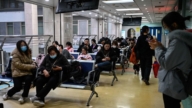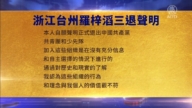【新唐人2014年11月04日訊】10月底,中共要求各地財政部門,以政府與社會資本合作的 PPP模式,也就是所謂的「公共私營合作制」,將政府債務轉為企業債務。同時,還提出了一份草案,允許地方政府發行地方債來償還舊債。中共人大常委承認,高達30萬億的地方債務,已經成為威脅中國經濟發展、社會穩定和政治安全的重要因素。而專家則指出,目前這種做法,就是讓社會大眾為這種威脅買單。
10月28號,《中國政府網》公布了財政部關於印發《地方政府存量債務納入預算管理清理甄別辦法》的通知,《辦法》中要求各地財政部門,通過政府與社會資本合作的PPP模式,將政府債務轉為企業債務。
這些債務包括,地方政府負有償還責任的債務、負有擔保責任的債務,以及可能承擔一定救助責任的債務。這樣一來,將可能有超過14萬億元地方債務,得到拆解。
《辦法》還強調,通過PPP模式轉化為企業債務的地方性融資,不再納入政府債務,同時對於部分在建項目,也需要優先通過PPP模式進行推進。
中國金融智庫研究員鞏勝利:「現在地方政府的這些企業都是有限責任公司,企業的債務政府肯定是不負擔的,最後的結果把老百姓的錢套進去。」
8月初,中共全國人大常委尹中卿曾向《中國經濟週刊》詳細解釋了地方債風險。尹中卿說,目前地方債的實際規模很可能超過30萬億元,地方政府除了顯性債務外,還存在著較多隱性債務。尹中卿指出,目前地方債務已經進入集中兌付期,成為威脅中國經濟持續發展、社會穩定和政治安全的重要因素。
另外,日前還有消息人士向《路透社》透露,財政部最近又提出了一份草案,允許地方政府發行地方債,來償還舊債。
《路透社》分析,如果這項草案成為法律,地方政府將獲准發行地方債,現有地方債務中,很大部分可以進行展期,地方債市場規模將需要迅速擴大。
旅美經濟評論家馬傑森:「好壞地方政府的債券混到一塊發行,老百姓去買,幫助地方政府過了這最艱難的一段,往後中共就印發鈔票,表面上拿回利息,但實際上老百姓的收益是不存在的。」
地方政府發行債券被外界認為違反中共法律。1994年中共《預演算法》中明確規定,地方政府不得發行地方政府債券。1995年制定的《擔保法》也明確規定,國家機關不得為保證人,但從1997年至今,地方債幾乎每年都增長了20%以上,其中1998年債務餘額比上年增長接近50%,而2009年比上年增長超過60%。
不過,2014年債臺高築的地方政府,發債利率卻低於國債。《路透社》認為,地方債市場開局值得懷疑。
旅美經濟評論家馬傑森:「它是忽悠老百姓進來,任何地方政府比國家債務(利率)低,這是不可能的,按任何正常的金融理念是不可能存在的。國債通常付的是最低的,因為國家不會倒掉嘛。」
有分析師指出,地方債務的利息低,可能是因為國內評級機構給出的高評級,也可能發債方與國有銀行串通。也有分析師對《路透社》說,內資國有銀行可能仍然是新債的可靠買家。
旅美經濟評論家傑森:「銀行不會拿著這種危險的股票,它最後會轉給老百姓。就是銀行買了以後呢,它可以在銀行打包,打包了以後,最後誰都不知道裡頭是甚麼東西,題目可以很好,最後利息配的很少,但是有很多壞賬,最終還是可能有很多是老百姓買了。」
尹中卿指出,地方債問題實際上是長期體制性因素,和短期經濟刺激政策共同作用的結果。他還說,如果執行嚴格的金融規則,不少地方債已經無法依靠「借新還舊」展期,如果按市場化要求,一些地方政府實際上已經破產。
採訪編輯/劉惠 後製/舒燦
Who Will Pay for the $3 Trillion Local Government Debts?
Beijing will encourage localities to use a Public-Private-
Partnership (PPP) model to help fresh fundraising.
This is to resolve outstanding local government debts.
In a finance draft, it would let local governments issue
fresh municipal bonds to replace borrowings.
The Communist Congress Standing Committee confirmed
the outstanding $3 trillion local debts.
These have threatened the economy, social stability
and political security.
Experts believe its current model is to force the public
to buy the bill.
On Oct. 28, the Chinese Ministry of Finance issued a
statement requesting local governments to use the PPP
model to finance new public sector projects with private
capital to reduce financing pressure on local governments.
These local governments debts are required to be repaid by
the local governments.
The implementation of the PPP model will dissolve more
than $1.4 trillion of local debts.
The statement also claimed that debt converted into
corporate bonds under the PPP model will not be
categorized as local government debt. Projects under
construction must be given priority to use the PPP model.
Chinese financial think tank researcher Gong Shengli: “These
local enterprises are limited liability companies.
The government will certainly hold no responsibility
for these companies’ debts.
In the end, people will be forced to pay for the debts."
In August, the Congress Standing Committee Yin Zhongqing
explained the risks of local government debts.
He told China Economic Weekly that the debts could have
exceeded $3 trillion with prominent hidden debts.
Local government debts have entered the period of
maturation.
Now they threaten the sustaining development of economy,
social stability and political security.
Sources told Reuters that the Finance Ministry has a draft
to issue local bonds to resolve local debts.
Reuters reported that opponents of the scheme say that by
issuing municipal bonds to replace existing fundraising tools
will require a massive expansion of China’s new municipal
bond market.
US-based economic commentator Ma Jiesen: “The mix of
local government bonds of good and bad will allow the
people to help the local governments to go through the
most difficult times. Later, the regime will print money.
On the surface, the interests are paid, but in fact,
the actual benefits don’t exist for the people."
Issuance of local bonds is a violation of the Chinese law.
China banned local governments from raising money
through bond sales in 1994.
The 1995 Security Law also restricted the state government
from acting as guarantor.
But since 1997, local government debt grew by more than
20% annually.
In 1998, in particular, debt grew nearly 50% from 1997 and,
in 2009 debts grew by more than 60% from the previous year.
Reuters also questioned the local bonds market for its lower
interest rate than the state bonds.
Ma Jiesen: “It was to deceive the people. There is no way the
local government bonds would have lower interest rates
than the state bonds. It is impossible according to the regular
financial philosophy.
State bonds have the lowest interest rates
for the state will not collapse."
Some analysts believe the lower interest rate of local bonds
was probably due to the high domestic ratings given
by rating agencies, or the collusion between the issuers
and the state-owned banks.
Analysts also told Reuters that domestic state-owned banks
may still be reliable buyers of new debt.
Ma Jiesen: “Banks will not hold on to these risky stocks.
It will eventually be transferred to the people.
The banks will buy it and package it under a good name,
with very low interest but as many bad debts.
In the end, people pay for the bill."
Yin Zhongqing noted that local government debts are issues
resulting from prolonged systematic factors and long-term
economic stimulus plans.
He said that even implementation of strict financial rules will
not resolve many local debts through rollover to new debts.
In fact, some local governments have already gone bankrupt
according to the market rule.
Interview & Edit/LiuHui Post-Production/ShuCan

























